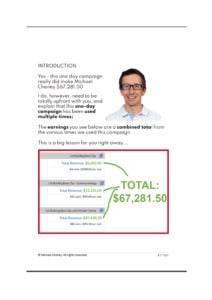In this post, we’ll walk you through the basics of affiliate marketing and provide recommendations on the best courses to teach you copywriting skills, how to select the right affiliate programmes, and tools you’ll need to automate parts of your business. By the end, you’ll have a solid understanding of how affiliate marketing works and be well on your way to landing your first sales and commissions. The key is just to start – dive in, learn and adapt as you go, and stay consistent. You’ve got this! Affiliate marketing may seem complicated now but stick with us and we’ll show you the ropes, one step at a time.

Introduction to Affiliate Marketing for Beginners
Affiliate marketing is a popular way to earn money online. As an affiliate, you promote other companies’ products and services. When someone buys through your link, you get a commission. It’s a win-win – companies get more sales, and you get paid.
To get started, you need to choose a niche and affiliate programmes to promote. Look for topics you enjoy and know well. Some popular niches are tech, beauty, fitness and finance. Find reputable companies with desirable, high-quality products. Make sure their affiliate terms and commission rates work for you.
You’ll also want to set up a website to promote the products. Build content like blog posts, reviews and videos around the items you want to sell. Share on social media to increase traffic. Use email marketing to stay in touch with readers. Provide useful information and be authentic. People will be more likely to buy from you if they trust your recommendations.
Another key part of affiliate marketing is split testing. Try different versions of your content to see what resonates most with your audience. You might test headlines, images, call-to-action buttons and product selections. Keep optimising to increase your conversion rates over time.
With some time and effort, affiliate marketing can become a sustainable source of income. Choose a niche you’re passionate about, select high-quality products to promote, build engaging content, connect with your readers, and keep testing and improving. Follow these basics and you’ll be earning solid commissions in no time. The key is simply getting started!

If you’ve been struggling online this report will open your eyes.
Affiliate Marketing for Beginners(Opens in a new browser tab)
Top Affiliate Marketing Courses for Learning Copywriting
To become an affiliate marketing pro, you’ll need to master the art of persuasive copywriting. Here are some of the top courses to help you learn:
The Complete Copywriting Course by Neil Patel and ConversionXL
This comprehensive course teaches you how to write copy that converts. You’ll learn techniques like using power words, writing persuasive headlines, and structuring your copy for maximum impact.
Copy School by Copy Hackers is another highly-rated course. It focuses on teaching you the fundamentals of direct-response copywriting, including how to identify your audience, choose a persuasive angle, and craft a compelling call-to-action.
If you prefer a more hands-on approach, Copywriting Secrets by Jim Edwards is a great choice. This practical course provides copy templates, examples, and exercises so you can strengthen your copywriting skills through practise.
For affiliate marketing in particular, Affiliate Copywriting Course by DigitalMarketer is tailored to help you optimise your affiliate promotions. You’ll discover how to find the right affiliate offers, position them effectively, and write persuasive copy that motivates readers to buy through your link.
While practise makes perfect, taking a specialised copywriting course can help you develop a strong foundation in persuasive writing and shortcut your path to success as an affiliate marketer. With the skills you gain, you’ll be crafting affiliate promotions that connect, convince, and convert readers into customers.

Become the Internet Marketing Millionaire’s Next Apprentice!!
Choosing the Right Affiliate Programmes for Your Niche
Choosing the right affiliate programmes for your niche is key to your success. The options are endless, so do your research to find ones that are the best fit. Some things to consider:
Relevance to your audience
Select programmes that offer products or services your readers will actually want and need. If you blog about parenting, for example, promotions for baby gear, toys, and family activities would likely resonate more than business software. Look for closely related categories that your readers will be interested in.
Commission and payout structure
Affiliate programmes vary widely in how much they pay and how often. Some pay per sale (a fixed amount or percentage of the sale price), while others pay per lead (customer contact information) or action (newsletter sign-up). Check the commission rates and minimum payout thresholds to make sure they are worthwhile before you invest time promoting the products. Some only pay out once you reach a minimum balance, like $50 or $100.
Cookie duration
The cookie duration refers to how long after someone clicks your affiliate link you get credit for any purchase they make. Longer cookies, like 60 or 90 days, are better since it allows more time for someone to buy after clicking your link. Short cookies may mean lost commissions if someone clicks but buys a week or two later.
Reliability and reputation
Choose programmes from reputable companies that pay on time and as promised. Read reviews from other affiliates to determine the general reputation and dependability of the programmes you’re interested in. The last thing you want is to put in work promoting products for a company that never pays out or abruptly shuts down the programme.
By focusing on these factors, you’ll find affiliate programmes that truly match your niche and audience. Do some testing with different programmes to see which ones drive the most traffic and commissions. You can then double down on the most successful partnerships.

Must-Have Software Tools to Boost Your Affiliate Earnings
To maximise your affiliate earnings, you’ll want to utilise some essential software tools. These will help you research products, track your links, analyse your traffic, and scale your campaigns.
Affiliate Tracking Software
Affiliate tracking software, like Post Affiliate Pro or AffiliateWP, helps you organise all your affiliate links and monitor which ones are driving the most traffic and sales. You’ll get real-time stats on clicks, conversions, and commissions so you know what’s working and can make data-driven decisions.
Keyword Research Tools
Keyword research tools, such as SEMrush, Ahrefs or Moz Keyword Explorer, help you find buyer keywords and long-tail keywords to target. Look for keywords with high search volume and low difficulty to rank for. Targeting the right keywords will get your content and offers in front of people who are ready to buy.
Analytics Software
Analytics software, like Google Analytics, allows you to see how visitors are finding your website, what content they engage with, their demographic info and behaviour. You can then optimise your content and affiliate offers based on these insights. See which social networks, search engines and referring sites are driving the most traffic so you can focus your efforts there.
Email Marketing Software
Email marketing software, such as Mailchimp, AWeber or ActiveCampaign, lets you build an email list and send newsletters, promotions and offers to your subscribers. Email marketing has one of the highest ROI’s and will be key to scaling your affiliate business. Provide value to build trust and only promote relevant, high-quality offers to your list.
Utilising the right tools for research, tracking, analysis and lead generation will give you key insights into your audience and allow you to make data-driven decisions to boost your affiliate income. The software options today are very affordable, easy to use, and can automate much of the process so you can focus on the strategic aspects of growing your business.
Next Steps: Getting Started With Affiliate Marketing Today
Now that you understand the basics, it’s time to dive in and get started with affiliate marketing. Here are some steps to take today:
Choose a niche
The first thing to decide is what niche you want to focus on. Pick an area you’re passionate about, that you have expertise in, or that you want to learn more about. Some popular affiliate niches include:
- Technology (software, gadgets, etc.)
- Health and fitness (supplements, equipment, etc.)
- Finance (credit cards, investing platforms, etc.)
- Travel (accommodation booking sites, flight deals, etc.)
Once you’ve selected a niche, look for affiliate programmes and products within that niche to promote.
Find affiliate programmes
Search for affiliate programmes in your chosen niche. Look for ones with generous commissions, a large range of products, and a solid reputation. Some top affiliate networks include:
- Amazon Associates
- eBay Partner Network
- Rakuten Affiliate Network
- CJ Affiliate by Conversant
Pick products to promote
Browse the affiliate programmes you’ve chosen and select some products you want to promote. Focus on ones that are popular, high quality, and that pay a good commission.
Create content
Start creating content like blog posts, videos, podcasts, and social media posts to generate traffic and promote your affiliate products. Provide honest reviews, recommendations and useful tips related to the products.
Track your progress
Use affiliate tracking software like Post Affiliate Pro to monitor things like clicks, sales, commissions, and analytics. See what’s working and make changes to improve your results over time.
Affiliate marketing does take work, but by following these steps you’ll be on your way to earning passive income and building a successful affiliate business. The key is to keep learning, optimising, and scaling up your efforts over the long run.
Conclusion
Affiliate marketing is more accessible than ever for beginners. With free resources to learn copywriting techniques, affiliate programmes that provide training, and tools to automate the process, you’ve got everything you need to get started. The key is simply to take that first step. Pick a niche you’re passionate about, choose a programme to promote their products, and start learning how to write compelling copy. Don’t get overwhelmed thinking you have to become an expert copywriter or learn every tool out there from the get-go. Start small, focus on one product at a time, and your skills and knowledge will grow over time.

Pingback: How to Blog effectively to maximise affiliate commissions